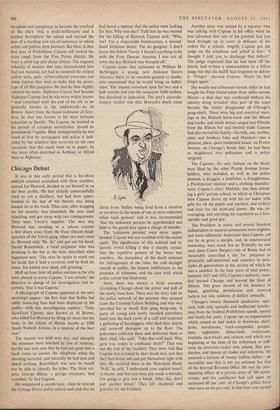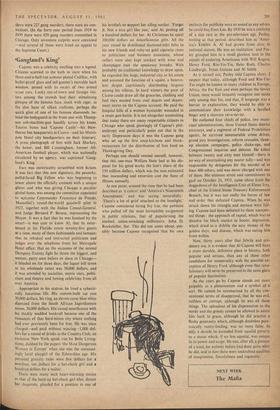Chicago Debut
It was in this early period that a lay-about odd-job criminal accredited with three murders, named Joe Howard, decided to cut himself in on the beer profits. He had already unsuccessfully tried to rob a distillery, but had been appre- hended as the last of ten barrels was being loaded on to his truck. That case, after dragging on for months, was dismissed. He next tried hijacking, and got away with two consignments. They were Torrio's supplies. The next day Howard was standing at a saloon counter a few doors away from the Four Deuces head- quarters of the Torrio gang, when two men came in. Howard said, 'Hi, Al,' and put out his hand. David Runelsbeck, a local carpenter who was drinking in the bar at the time, described what happened next. 'The man he spoke to stuck out his hand, but it held a revolver, and he fired six times. Joe keeled over dead, still grinning.'
Half an hour later all police stations in the city were alerted to arrest Capone. 'I am certain,' the detective in charge of the investigation told re- porters, `that it was Capone.'
A photograph of Capone appeared in the next morning's papers—the first time that flabby but oddly menacing face had been displayed to the public—with this unambiguous caption : `Tony (Scarface) Capone, also known as Al Brown, who killed Joe Howard by firing six shots into his body in the saloon of Heinie Jacobs at 2300 I South Wabali Avenue, in a renewal of the beer war.'
The inquest was held next day, and abruptly the witnesses were attacked by loss of memory. Jacobs was now sure that he hid just gone into a back room to answer the telephone when the shooting occurred, and naturally he had seen and heard nothing. Runelsbeck was sure he would not be able to identify the killer. The third wit- ness, George Bilton, a garage mechanic, had vanished. So had Capone.
He reappeared a month later, when he entered the Cottage Grove police station and said that he had heard a rumour that the police were looking for him. Why was that? Told that he was wanted for the killing of Howard, Capone said: 'Who, me? I'm a respectable businessman, a second- hand furniture dealer. I'm no gangster. I don't know this fellow Torrio. I haven't anything to do with the Four Deuces. Anyway I was out of 'town the day Howard was bumped off.'
Capone made that statement to William H. McSwiggin, a young, new ,Assistant State's Attorney (later to be machine-gunned to death), who announced that he would bring an indict- ment. The inquest remained open for two and a half months and cost the taxpayers 4,000 dollars, but dissolved in indecision. The jury's unrevela- tionary verdict was that Howard's death came about from 'bullets being fired from a revolver or revolvers in the hands of one or more unknown white male persons' and it was recommended 'that the unknown persons be apprehended and held to the grand jury upon a charge of murder.'
The 'unknown persons' were never appre- hended. Capone was not troubled with the matter again. The significance of this isolated and re- latively trivial killing is that it sharply crystal- lises the repetitive • pattern of the booze war murders: the immediacy of the death sentence for infringement of the rules, the cold daylight assault in public, the brazen indifference to the presence of witnesses, and the ease with which police action was frustrated.
Soon, there was always a fresh anecdote circulating Chicago about the power and pull of the newly risen boss. There was the story told on the police network of the prisoner who escaped from the Criminal Courts Building and who was searched for in South Side gang hang-outs. A party of young and newly enrolled patrolmen burst into the back room of a caf6 and surprised a gathering of bootleggers, who shed their pistols and sawn-off shot-guns on to the floor. The policemen collected these and delivered them to their chief, who said : 'Take that stuff back. Who gave you orders to confiscate them?' That was not the end of the incident. They were told that Capone was irritated by their brash zeal, and that they had better call and put themselves right with him. He received them at the Metropole Hotel. 'Well,' he said, 'I understand your captain wasn't to blame, and that you boys just made a mistake. I'm going to give you a break. After this, don't pull another boner.' They left chastened and grateful for the kindness. Another story was related by a reporter who was talking with Capone in his office when he was informed that one of his gunmen had just been brought up in court in defiance of his orders for a' release. Angrily Capone got the judge on the telephone and yelled at him: 'I thought I told you to discharge that fellow?' The judge explained that he had been off the bench, had written a memorandum to a fellow judge but that his bailiff had forgotten to deliver it 'Forget!' shouted Capone. 'Don't let him forget again.'
His wealth and influenced waxed. After he had bought his Palm Island estate three miles outside Miami—a deal that was conducted without his identity being revealed—that part of the coast became the winter playground of Chicago's gang-chiefs. There were big and convivial meet- ings at the Hialeah horse-track and the Miami dog-tracks, and much money surged into Florida from the Illinois bar and brothel trade. Capone had also moved his family—his wife, son, mother, sister and brothers John and Matthew—into a pleasant, plain, quiet residential house on Prairie Avenue, on Chicago's South Side; he had there as neighbours two policemen and a police sergeant.
The Capones, the only Italians on the block, were liked by the other Prairie Avenue house- holders, who included, as well as the police element, a druggist, a publisher, a draughtsman, a Presbyterian minister and a clothing manufac- turer. Capone's sister, Mafalda, was then attend- ing a girls' private school, to which at Christmas time Capone drove up with his car laden with gifts for all the pupils and teachers, and turkeys and fruit for the term-end dinner. He was en- couraging, and enjoying, his reputation as a frce- spender and good guy.
The President in status and several hundred industrialists in material possessions were mightier and more influential Americans than Capone, yet not by so great a margin, and, in concentrated autonomy, were much less so. Probably no one man since Cesare Borgia's rule of Rome had so inexorably controlled a city for purposes so piratically self-interested and contrary to prin- ciples of government in the society of which he was a membir. In his four years of total power, between 1927 and 1931, Capone's authority rami- fied beyond Chicago and beyond the State of Illinois. The gross income of his business in liquor, gambling, prostitution and, assorted rackets ran into millions of dollars annually.
Chicago's twenty thousand speakeasies oper- ated, with only sporadic and ineffectual interfer- ence from the Federal Prohibition squads, openly and busily for years. Capone ran an organisation which owned or had stakes in breweries, distil- leries, warehouses, truck-companies, garages, bars, nightclubs, dance-halls, restaurants, brothels, race-tracks and casinos, and which was beginning at the time of his retirement to infil- trate its extortion racket into unions, film pro- duction and dozens of trades and industries. He amassed a fortune of twenty million dollars—an incredible sum that is not my estimate but that of the Internal Revenue Office. He was the com- manding officer of a private army of 700 storm- troops, and for auxiliaries had call upon an estimated 60 per cent. of Chicago's police force who were on his pay-roll. In that four-year period there were 227 gang murders; there were no con- victions. (In the forty-year period from 1919 to 1959 there were 929 gang murders committed in Chicago. Only seventeen culprits were convicted —and several of those were freed on appeal to the Supreme Court.)































 Previous page
Previous page